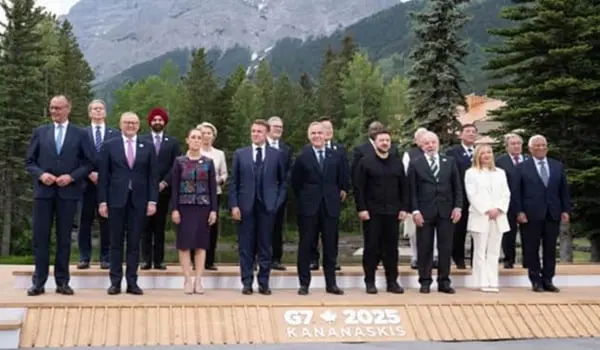The G7 Summit 2025, held in Berlin from June 25–27, concluded with a renewed commitment from the world’s leading advanced economies to tackle climate change, reshape global economic governance, and address ongoing geopolitical crises. The G7 — comprising the United States, the United Kingdom, France, Germany, Italy, Japan, and Canada — invited key partner countries, including India, Brazil, and South Africa, reflecting the growing recognition of emerging economies’ roles in shaping global outcomes.
The summit’s central theme was ‘Green Growth for a Resilient Future’, highlighting the urgency of accelerating the transition to renewable energy, cutting greenhouse gas emissions, and supporting climate adaptation in vulnerable nations. The G7 countries pledged to collectively mobilize $200 billion by 2030 to assist developing countries in their climate adaptation and mitigation efforts — an amount experts say is crucial to achieving the Paris Agreement targets.
G7 Summit 2025: India’s Presence
India’s presence at the summit was significant. Prime Minister Narendra Modi, addressing the plenary session, emphasized that climate justice must remain at the core of any global climate agreement. He pointed out that developed nations have historically contributed the most to global warming and must therefore take a larger share of responsibility by providing adequate climate finance and green technology transfers.
In a bilateral meeting with German Chancellor Anna Schneider, PM Modi discussed opportunities for joint ventures in green hydrogen, electric vehicles, and sustainable agriculture technologies. The India-Germany Green Hydrogen Partnership, initiated in 2024, saw a commitment of an additional €5 billion investment to scale up production capacity in India, supporting India’s target of becoming a global leader in green hydrogen exports by 2030.
Geopolitical tensions dominated parts of the summit. The leaders reaffirmed their support for Ukraine, pledging $75 billion in new aid and tightening sanctions on Russia’s energy exports and financial institutions. On the Middle East, the G7 called for an immediate ceasefire in the Israel-Gaza conflict and promised humanitarian assistance.
For India, participation in these discussions strengthened its diplomatic stature. It showcased India’s strategic balancing act: maintaining energy ties with Russia while aligning with Western powers on climate and economic stability. Analysts believe India’s engagement at the summit will bolster its credibility as it prepares to host the G20 Summit later this year.
The summit also touched on emerging challenges in global governance: the regulation of artificial intelligence, cyber security, food security in light of climate disruptions, and reforms to multilateral institutions like the World Trade Organization and International Monetary Fund to better represent developing nations.
From an exam perspective, students should focus on:
- The structure and mandate of the G7 and its relation to G20.
- India’s climate commitments, especially its target of net-zero emissions by 2070 and the role of initiatives like the National Green Hydrogen Mission.
- Climate finance, loss and damage, and the principle of common but differentiated responsibilities (CBDR).
- Implications of geopolitical issues on India’s foreign policy and economy.
The outcomes of the G7 Summit underline the interconnectedness of climate change, energy security, and geopolitical stability. They highlight how India, as a major developing economy, must balance its developmental needs with global climate responsibilities — a critical area for aspirants to analyze in essays and GS-II/GS-III answers.

